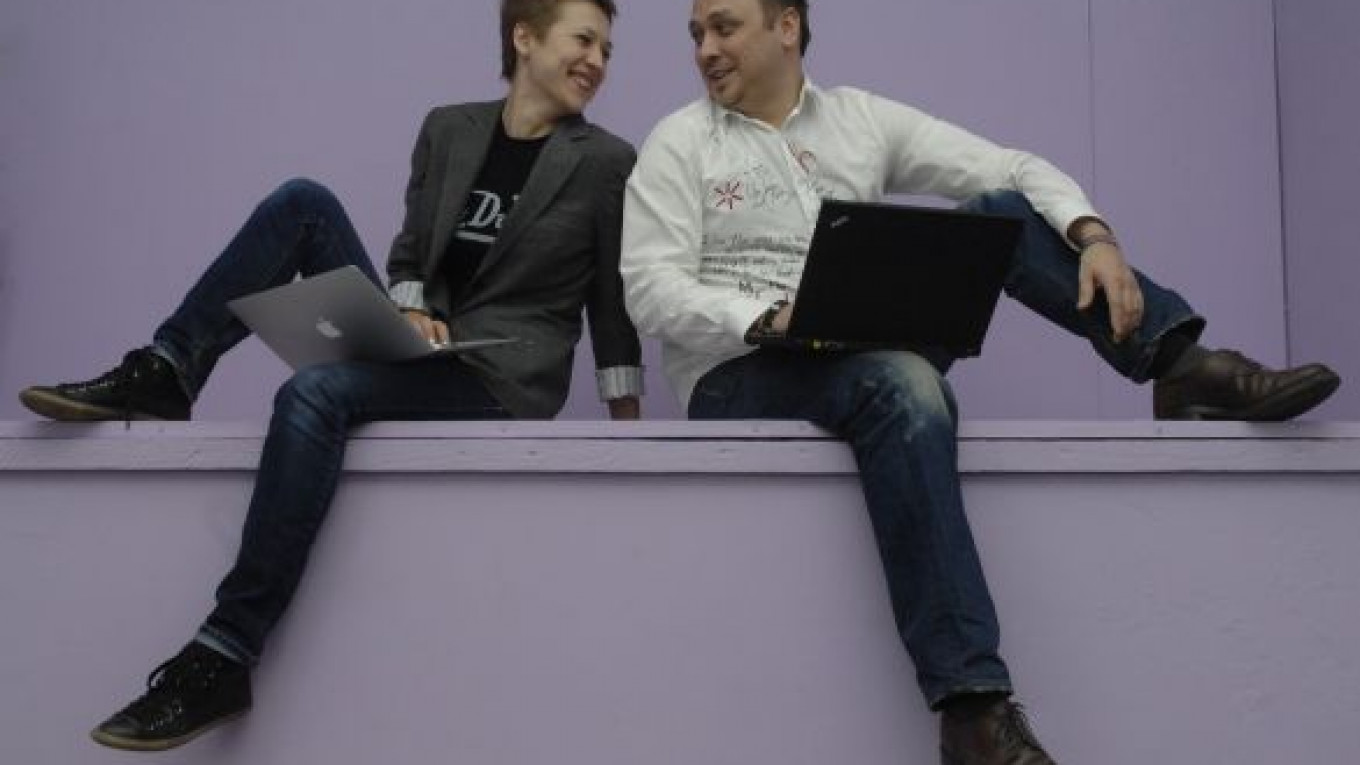Travel club HipClub collected about 100,000 users in half a year, and the company earns $1 to $2 dollars per month from each of them.
A family business belonging to Mikhail and Irina Reider, it is counting on a fashionable trend: the flicker of sales of various hotels and tours at up to a 70 percent discount.
The privately held company began with the relationship of its owners. Irina and Mikhail met at consulting company Strategica, where she had landed in 2005 as a trainee and where he was already working as a project manager. Their workplace romance wasn't hindered, though, because they didn't have direct supervisors, Irina said. They married in 2008, and a year later they decided to leave their employer. "I was getting tired of consulting. You design a good project, but the client achieves only 20 percent of it," Irina said.
The couple traveled often, and they had amassed complaints about the tour industry. It was a closed market, they concluded. Tour operators and agencies had a full arsenal of cheating techniques, and the information they provided was incomplete and difficult for the typical tourist to access. It was out of these disillusions that the idea for creating HipWay, a tour-selling service, cropped up.
A Tour Supermarket
The web site HipWay.ru launched in the spring of last year. Its founders had an ambitious goal: to make a sort of tourist eBay, or a version of the mega-popular online auction site. They put up a simple but eye-catching advertisement for tours on HipWay.ru.
The Reiders thought up a way to segment travel according to clients' preferences, such as ecological tourism, adventures, pilgrimages and event-driven tours, trips for shopping lovers, sports and children's vacations. The site began to function as an Internet store for trips, where users could not only make reservations, but pay for tours as well.
"We were lucky," Irina said. "For the design of the site, we got a young company from St. Petersburg that planned to use our project as a case study." She explained, "For a reasonable amount of money, they did the work conscientiously." The developers' efforts cost roughly $15,000 to $20,000.
At the start of the project the couple latched on the concept of placing on the site only unconventional tours. One of the first arrived in the form of the company Mini-Piter, or Mini-St. Petersburg. In its tour, two young women showed tourists unusual aspects of the northern capital from the vantage of a Mini Cooper, with nights spent at mini-hotels.
"Later there were standard requests, such as people just wanting [a trip to] Turkey," Mikhail said. "We would beg them for a tour. After all, we decided to be a client-oriented company."
Family, Friends and Angels
Finding money for the first round of investment, the so-called seed round, turned out to be easier than the second, or angel, round. Typically the cultivation stage is also financed by sources known as the three F's in English, for family, friends and fools, Mikhail said with a grin. He and his wife, however, put up their own money, laying out $70,000 for the business.
Searching for angel investors took more time and effort. Mikhail said, "Unfortunately, [companies] like ours can't count on Russian venture businessmen." He added, "If they invest in a project at 100 percent, then the entrepreneurs will find themselves only the role of so-called managers."
The Reiders made contact with friends who had founded Russian startup Wikimart, which already is successfully searching for investors outside Russia. Those friends introduced the entrepreneurs to businessmen who took an interest in HipWay. After many months of discussion, Mikhail recounted, several hundreds of letters about "raising money" came in.
By last summer, investors in HipWay included Michael van Swaaij, former chief executive of web video-conferencing service Skype; Chamath Palihapitiya, a vice president at social network Facebook; and Javier Perez Tenessa, founder of online travel agency eDreams. Irina and Mikhail Reider kept control of the company.
With the help of their new partners, the entrepreneurs' project received support to the tune of $750,000. "These people are helping us not only by way of financing, but also by way of valuable advice," Mikhail said.
"We are discussing the company's strategy, and they are acquainting us with entrepreneurs, with people working in this field in other countries — Brazil, Turkey, closer places," he added. "Sometimes they even help us with advice on the working of the site. Three hours after his purchase, Michael van Swaaij wrote to us, 'Guys, make a clickable map.'"
"The most important thing is that with them, we changed the business' strategy, putting the emphasis on flash sales limited by time, 'shimmer' sales on the new HipClub.ru," Mikhail said.
HipWay's business model is counting on long-term investment. Mikhail said, "When we discussed our strategy with potential investors, they said, 'You need something that blows open the market.'"
A Message from The Moscow Times:
Dear readers,
We are facing unprecedented challenges. Russia's Prosecutor General's Office has designated The Moscow Times as an "undesirable" organization, criminalizing our work and putting our staff at risk of prosecution. This follows our earlier unjust labeling as a "foreign agent."
These actions are direct attempts to silence independent journalism in Russia. The authorities claim our work "discredits the decisions of the Russian leadership." We see things differently: we strive to provide accurate, unbiased reporting on Russia.
We, the journalists of The Moscow Times, refuse to be silenced. But to continue our work, we need your help.
Your support, no matter how small, makes a world of difference. If you can, please support us monthly starting from just $2. It's quick to set up, and every contribution makes a significant impact.
By supporting The Moscow Times, you're defending open, independent journalism in the face of repression. Thank you for standing with us.
Remind me later.






